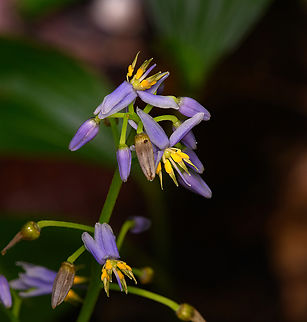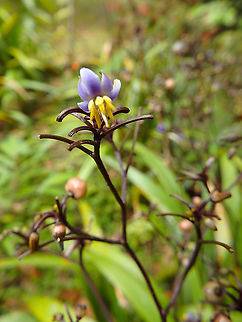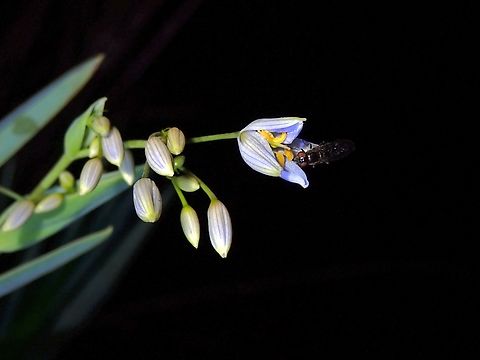
Appearance
The cerulean flaxlily has compressed flattened stems. Leaves have parallel venation with finely serrated margins. The serrations may only be visible on one margin of the leaf. The terminal florets form a panicle which grows beyond the height of the lily by about 0.25 m. The perfect flowers have three sepals and three petals and are white with a yellowish tint. Fruits are succulent, bright, violet-blue berries typically containing five shiny, black seeds. While the plant flowers and fruits most prolifically during the warm months of the year, some flowers and fruit can be present on plants throughout the year. The pulp of the berries is high in carbohydrates.
Distribution
From Southern tropical Africa, through tropical and subtropical Asia to Indonesia and the Philippines.
Habitat
Low altitude evergreen rainforest, often beside rivers, in deep shade of forest floor, usually forming dense stands. Forests and grassy slopes from near sea level to elevations of 1,700 metres in southern China.In its native range, the cerulean flaxlily occurs in open shrubland, evergreen rainforests, wet pinelands, coastal dunes, sandbars, grasslands and open lowland forests, from sea level to 1600 m. It occurs in a wide variety of niches in both temperate to tropical climates, and proliferates in open or shaded habitats. It seems to tolerate a wide range of temperature, light, moisture, soils and elevation.
Reproduction
It is eaten by some birds in their native habitat, which results in the spread of seeds.Defense
The seeds have been used as a natural rodenticide and are reported to be toxic to livestock, which indicates they are not likely to be dispersed by most mammals (Wang, 1984).Uses
The plant is sometimes gathered from the wild for use as a medicine, insect, pesticide and dye. It is grown as an ornamental, especially in rockeries.References:
Some text fragments are auto parsed from Wikipedia.
http://tropical.theferns.info/viewtropical.php?id=Dianella+ensifoliahttp://plants.ifas.ufl.edu/plant-directory/dianella-ensifolia/